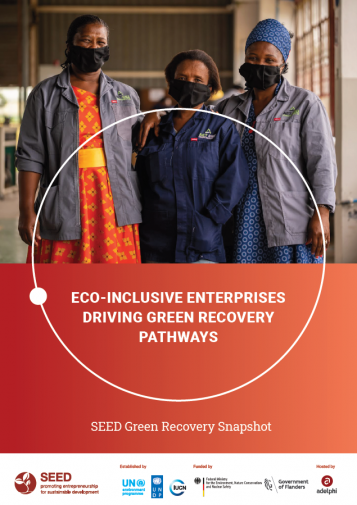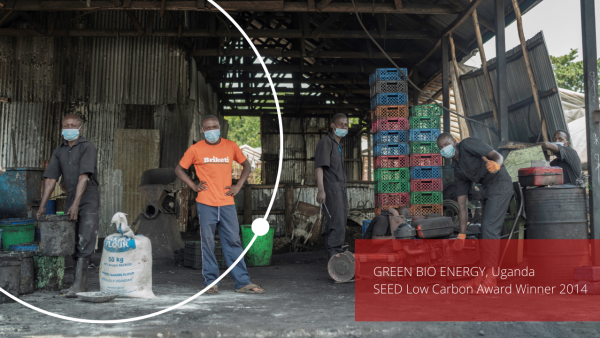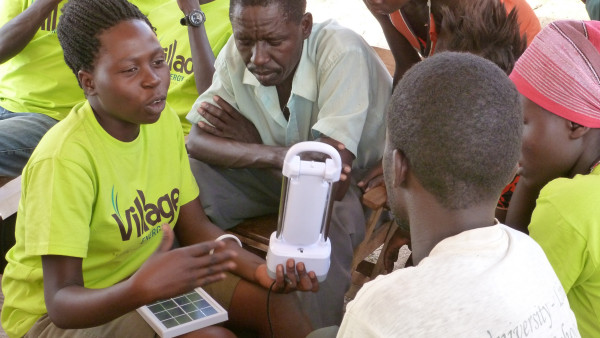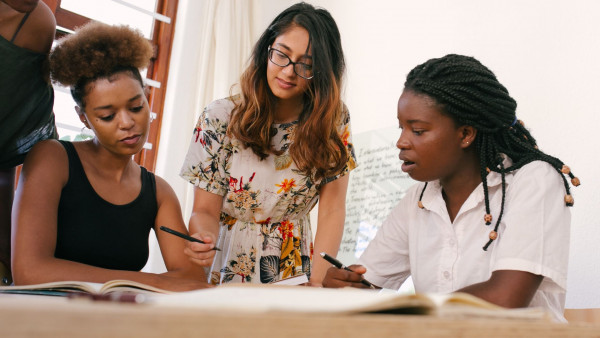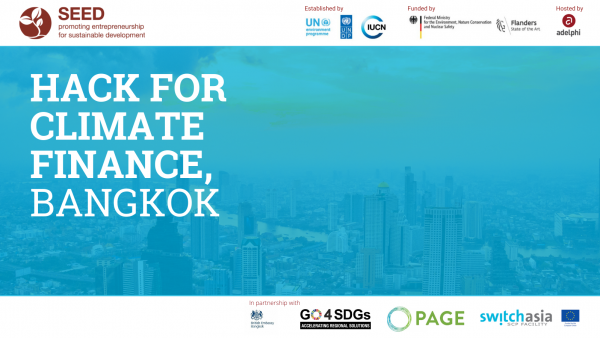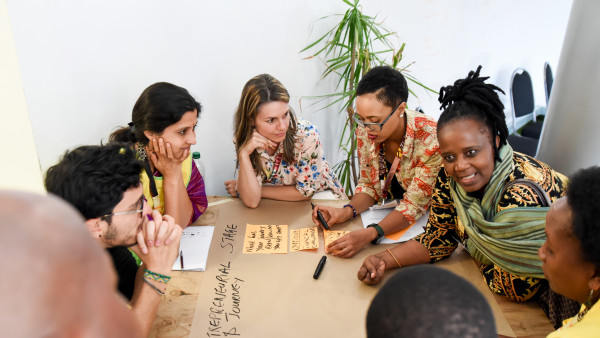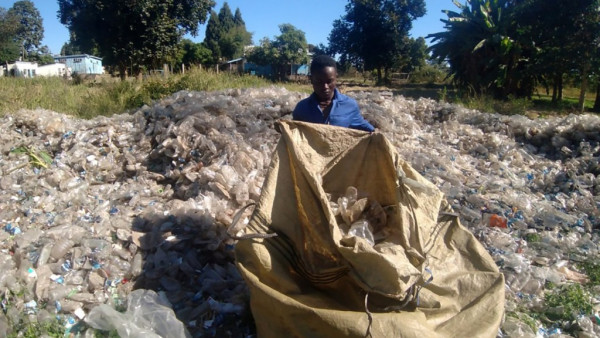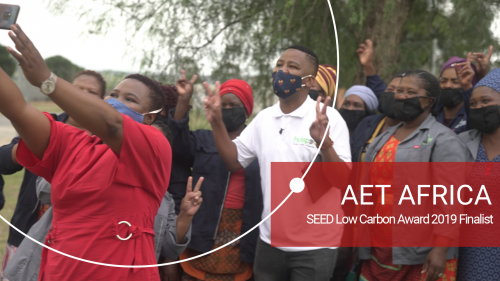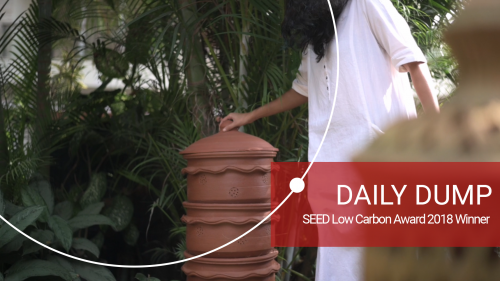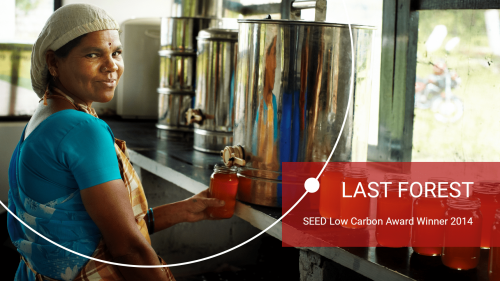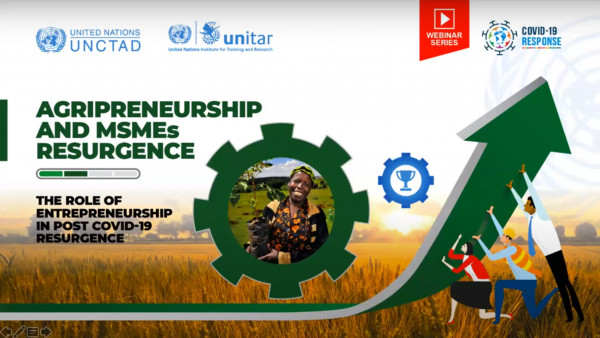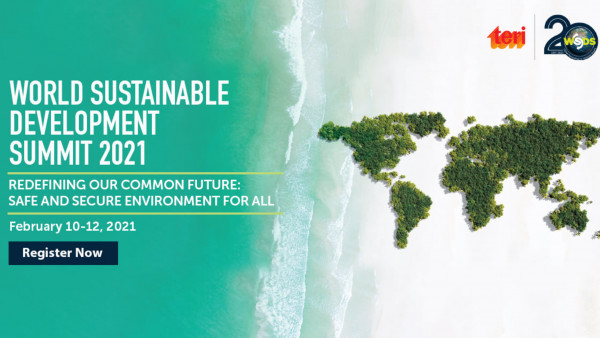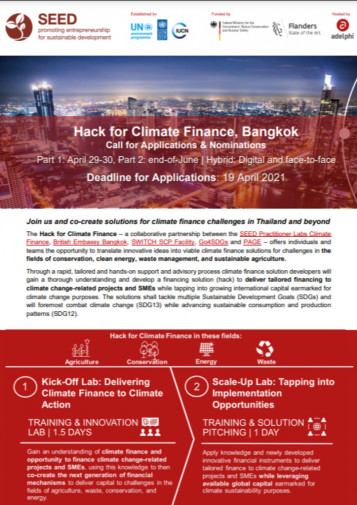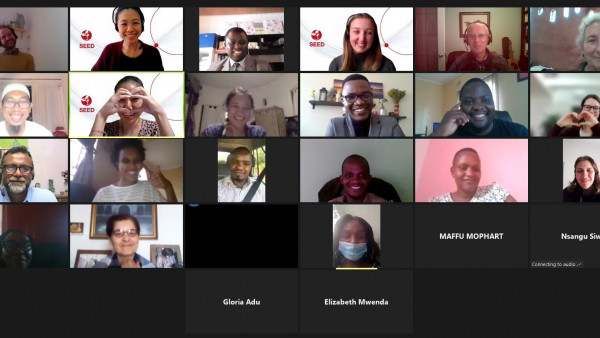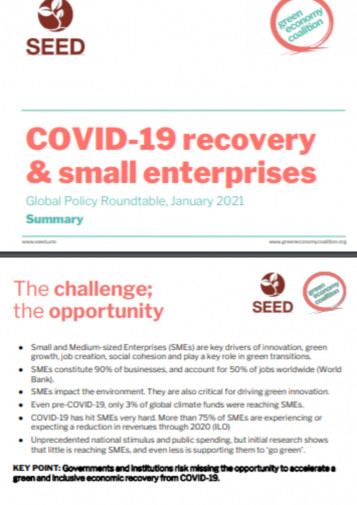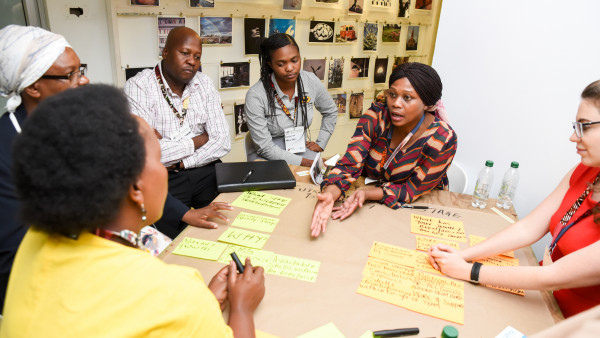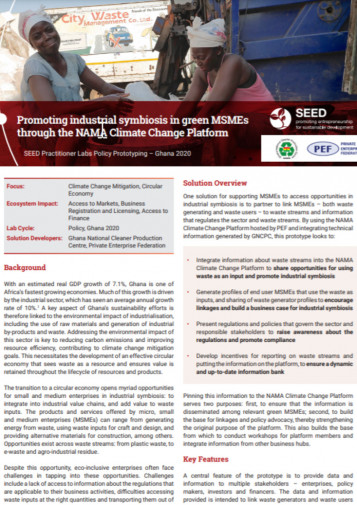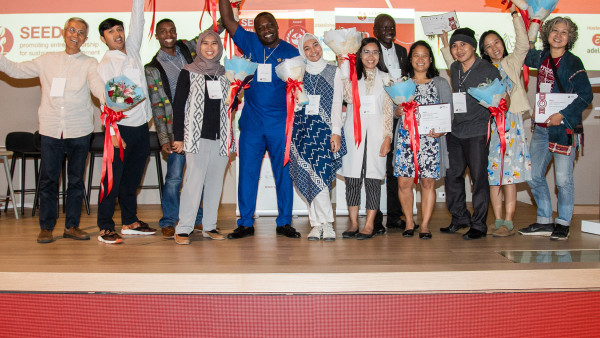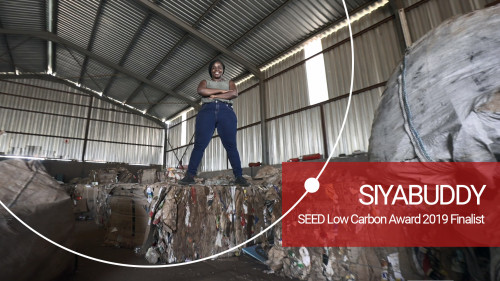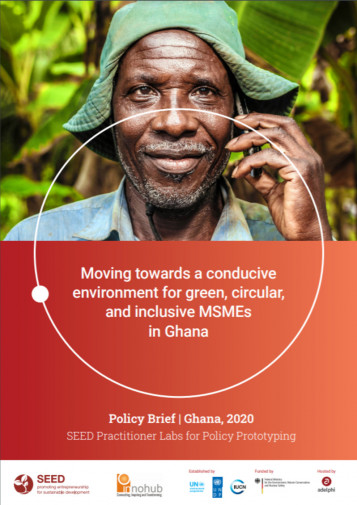Eco-Inclusive Enterprises Driving Green Recovery Pathways
Published: 09 July 2021 Benita Rose, Mirko Zürker, Sonya Ong
This snapshot report is intended for national policy makers and shapers; global policy and finance institutions; researchers and civil society networks. Drawing on direct insights from micro, small and medium enterprises as well as eco-system support organisations, it highlights the existing support gaps, concrete examples and new opportunities for catalysing a green, inclusive recovery from COVID-19. Read more
Green Bio Energy from Uganda
Published: 09 July 2021
Green Bio Energy is a young, award-winning social enterprise, which offers low-income Ugandan families access to cost-saving, eco-friendly and safe energy solutions. Read more
SDGs:





Farmerline CEO spoke at the Bloomberg New Economy Catalyst
Source: Bloomberg
Alloysius Attah, CEO at Farmerline, discussed the impact of agritech on rural jobs; feeding the world amidst climate change; and Africa and China’s promising tech trends at Bloomberg’s virtual program, which celebrates the innovators, visionaries, scientists, policymakers, and entrepreneurs accelerating solutions to today’s greatest problems. Read more
CNN features SEED and UGEFA enterprises in Uganda
Source: CNN
CNN features SEED supported enterprises 'Village Energy and Khainza Energy' and UGEFA supported enterprise 'WEYE Clean Energy' for their innovation and activities to contribute to a sustainable future. Read more
SEED launches Green Finance Academy Trainings and Innovation Lab
Published: 28 June 2021
The Academy is aimed at the local bank staff and other finance actors that want to finance more successfully green small- and medium-sized enterprises (SMEs) and environmental-related projects in Uganda. Read more
Hack for Climate Finance, Bangkok
Published: 16 June 2021
Learn how to tap into growing international capital earmarked for climate change purposes.
Join us on 30th June 2021 at 3:00-5:00 pm (BKK/GMT+7) Read more
Join us on 30th June 2021 at 3:00-5:00 pm (BKK/GMT+7) Read more
SDGs:





Showcasing and replicating break-through policies for sustainability
Published: 14 June 2021
SEED piloted a new Lab format together with the GO4SDGs platform: the SEED Regional Practitioner Labs for Policy Prototyping. The Labs showcase innovative, breakthrough policies and policy programmes, the Labs were based on the theory of change that replication is an effective and efficient way to solve similar problems across geographies. Read more
SDGs:







ONergy Solar, a SEED Story from India
Published: 31 May 2021
ONergy Solar is an end-to- end solar solution expert offering design, engineering, manufacturing, installation, O&M and solar consultancy services for solar rooftop powerplant, solar irrigation pumping, solar lighting and microgrids for rural communities in India. Their solutions and services are focused towards reducing energy costs for their customers. Read more
SDGs:





Building Materials a New Market for Trash
Tonderayi Mukeredzi Source: YesMagazine
“We wanted a solution to plastic waste as well as a profitable solution that would also improve the lives of people as much as it improved our environment,” says Fadzai Munyuki, the managing director and one of four co-founders of a waste management start-up called Kudiwa Waste and Energy Solutions (KWES). Read more
SDGs:





AET Africa, a SEED Story from South Africa
Published: 03 May 2021
AET AFRICA innovates, manufactures and supplies energy efficiency products for water heating and cooling systems and also conducts research on innovating those technologies. Read more
SDGs:





SEED Participates in GO4SDGs High level launch in Asia and the Pacific
Published: 22 April 2021
This session presented best practices and initiatives of circular economy models among MSMEs in the Asia and Pacific region, with discussions highlighting policy and finance instruments that support enterprises.
Read more
Read more
Daily Dump, a SEED Story from India
Published: 19 April 2021
Daily Dump works to redefine people’s perception of and relationship with the earth, each other and our urban spaces. It is the first company in India to design a home composter, adapted for tight urban spaces and with a unique terracotta design. Read more
SDGs:









Last Forest, a SEED Story from India
Published: 29 March 2021
New SEED case study from 2014 Low Carbon Award Winner Last Forest, an enterprise in India that increases the demand for organic agricultural production and offers indigenous communities a sustainable source of income. Read more
SDGs:





SEED joins UNCTAD - UNITAR webinar to discuss agripreneurship and MSMEs resurgence
Published: 29 March 2021
SEED participates in a virtual discussion is to identify and analyse the main impacts of COVID-19 on entrepreneurs and MSMEs Read more
SEED joins the World Sustainable Development Summit on mainstreaming climate finance solutions in SMEs
Published: 29 March 2021
Climate Finance for small and medium enterprises (SMEs) is a key component for addressing India’s climate action and sustainable development agendas. Read more
Hack for Climate Finance, Bangkok: Call for Applications
Published: 24 March 2021
The Hack for Climate Finance – a collaborative partnership between the SEED Practitioner Labs Climate Finance, British Embassy Bangkok, SWITCH SCP Facility, Go4SDGs and PAGE – offers individuals and teams the opportunity to translate innovative ideas into viable climate finance solutions for challenges in the fields of conservation, clean energy, waste management, and sustainable agriculture. Read more
SEED Alumni Social Meet-Up
Published: 23 March 2021
SEED held our first SEED Alumni Social Meet-Up session last Thursday with participants of the past SEED Catalyser and Accelerator programmes from all over the world. Read more
SDGs:

COVID-19 Recovery & Small Enterprises: A SEED-GEC Global Policy Roundtable
Published: 23 March 2021
In January 2021, SEED and the Green Economy Coalition held an online, interactive roundtable gathering small enterprise networks, policy practitioners, NGOs and think tanks to exchange knowledge and share interventions on how to ensure that our Green Recovery efforts are impacting small businesses. Read more
SEED and PAGE Collaborate to Fuel Eco-Inclusive Enterprises in a Green Transition
Published: 09 March 2021
SEED and PAGE, the Partnership for Action on Green Economy, are uniting to amplify the impact of eco-inclusive enterprises. Read more
Effective implementation of circular economies
Published: 03 March 2021 Camilla Shearman, Sonya Ong
At the 2020 SEED Practitioner Labs for Policy Prototyping (PLPP) in Ghana and Thailand, multi-stakeholder groups designed support mechanisms to leverage the participation of socially inclusive and environmentally sustainable MSMEs in the circular economy. We provide recommendations based on the solutions developed to guide future circular economy policy implementation. Read more
SDGs:





Promoting industrial symbiosis in green MSMEs | Ghana, Policy 2020
Published: 02 February 2021 Amanda Panella, Camilla Shearman
This solution overview from PEF and GNCPC in Ghana outlines a policy prototype generated through the SEED Practitioner Labs for Policy Prototyping, addressing Ghana's policy goals in relation to SMEs. Read more
Call for Applications: SEED Awards 2021 offers support, visibility and funding up to €15,000 for social and environmental SMEs
Published: 01 February 2021
Up to 48 prize packages will be awarded to innovative and promising locally led enterprises in social and environmental sectors from emerging economies. This year, in its 14th cycle, two award categories are offered. Read more
SEED Covid-19 Resilience Workshops and Grants (SEED Alumni Malawi, Zambia, Zimbabwe)
Published: 28 January 2021
During a 2-day workshop in each of the three target countries (Malawi, Zambia and Zimbabwe), SEED will provide you with the most relevant tools to work on your enterprise resilience. Read more
Siyabuddy, a SEED Story from South Africa
Published: 27 January 2021
Siyabuddy empowers community members to collect waste from different sources like shopping centres, hospitals, illegal dumping sites, etc. The company trains the collectors on waste separation, pays them per kg collected and ultimately sells the collected waste to recyclers all across South Africa. Read more
SDGs:





Moving towards a conducive environment for green, circular, and inclusive MSMEs in Ghana
Published: 25 January 2021 Amanda Panella, Camilla Shearman, Doris Awortwi-Tandoh, Kodjo Barnor, Letitia Varney, Thomas Wiredu
This policy brief investigates how green MSMEs face challenges when accessing finance, finding markets, and navigating a dynamic policy landscape and explores how partnerships between policy makers and ecosystem players can help target support of the MSMEs and overcome these barriers. Read more

